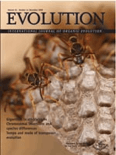
EVOLUTION
Scope & Guideline
Transforming Perspectives on Biological Evolution
Introduction
Aims and Scopes
- Evolutionary Genetics:
This area focuses on the genetic underpinnings of evolutionary processes, including the role of mutations, genetic drift, and selection in shaping genetic diversity and adaptation. - Ecological Evolution:
Research in this domain explores how ecological interactions influence evolutionary trajectories, emphasizing coevolution, niche adaptation, and the impact of environmental changes on species. - Sexual Selection and Mating Systems:
This theme investigates the dynamics of sexual selection, mate choice, and reproductive strategies, highlighting how these factors drive phenotypic diversity and speciation. - Phenotypic Plasticity and Adaptation:
Studies in this area examine how organisms adjust their phenotypes in response to environmental variations, contributing to our understanding of adaptive evolution and resilience. - Speciation and Hybridization:
Research here addresses the mechanisms of speciation, including the genetic and ecological processes that lead to reproductive isolation and the role of hybridization in evolutionary dynamics. - Conservation and Evolutionary Rescue:
This scope looks at the implications of evolutionary biology for conservation efforts, particularly how evolutionary principles can inform strategies for preserving biodiversity in changing environments.
Trending and Emerging
- Integrative Genomics and Evolution:
There is a growing trend towards using genomic approaches to understand evolutionary processes, including the exploration of how genetic variation influences adaptation and speciation. - Climate Change and Evolutionary Responses:
Research focusing on how climate change affects evolutionary dynamics is on the rise, emphasizing the urgent need to understand adaptive responses in various taxa. - Microbiome and Evolutionary Interactions:
The study of how microbial communities influence host evolution is gaining traction, reflecting a broader understanding of the interconnectedness of life forms. - Evo-Devo Perspectives:
An increasing number of studies are exploring the intersection of evolutionary and developmental biology, particularly how developmental processes influence evolutionary outcomes. - Social Evolution and Behavior:
There is an emerging focus on the evolution of social behaviors and structures, particularly in cooperative species, highlighting the evolutionary significance of social dynamics. - Applications of Evolutionary Theory in Medicine:
A growing trend involves applying evolutionary principles to understand and address medical challenges, such as the evolution of pathogens and resistance to treatments.
Declining or Waning
- Classical Macroevolutionary Studies:
There seems to be a waning interest in traditional macroevolutionary frameworks that focus solely on lineage diversification patterns without integrating genetic and ecological data. - Laboratory-Based Evolution Experiments:
Although still relevant, the frequency of papers relying solely on laboratory experiments to study evolution appears to be decreasing, indicating a shift towards more field-based and integrative approaches. - Historical Biogeography:
Research that exclusively focuses on historical biogeography without considering contemporary ecological dynamics is becoming less common, as current studies emphasize the interplay between historical and modern factors. - Morphological Evolution in Isolation:
The emphasis on studying morphological evolution in isolated environments without considering ecological interactions or genetic factors is declining, as researchers increasingly recognize the importance of integrative approaches.
Similar Journals
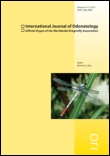
INTERNATIONAL JOURNAL OF ODONATOLOGY
Innovating Insights into Odonatology and BeyondINTERNATIONAL JOURNAL OF ODONATOLOGY, published by Wachholtz Verlag GmbH, is a vital resource for researchers and professionals in the fields of Ecology, Evolution, Behavior, and Insect Science. Established in 1998, this journal provides a platform for the dissemination of innovative research pertaining to odonatology, encompassing the ecological and biological interactions of dragonflies and damselflies. With its focus on advancing knowledge within these scientific disciplines, the journal holds a commendable Q3 ranking in Ecology, Evolution, Behavior and Systematics and a Q2 ranking in Insect Science for 2023, reflecting its significance in academic circles. Although it operates without open access, its articles are accessible through institutional subscriptions, allowing for wide dissemination among scholars and practitioners. The journal's commitment to publishing high-quality, peer-reviewed research makes it an authoritative source of information that enriches the study of odonates and their broader ecological contexts. For inquiries, the journal's editorial team can be reached at C/O Fleet7, Fleethorn 7, Kiel 24103, Germany.

Evolution Letters
Unlocking the mysteries of life through open access research.Evolution Letters is a premier Open Access journal published by Oxford University Press, dedicated to advancing research in the interdisciplinary fields of Ecology, Evolution, and Genetics. Since its launch in 2017, this journal has rapidly established itself as a leading platform for high-quality research and innovative studies, as reflected by its impressive Q1 quartile rankings in both Ecology, Evolution, Behavior and Systematics and Genetics for 2023. With a remarkable Scopus ranking placing it in the top 3% in its categories, Evolution Letters serves as a vital resource for scholars and practitioners seeking to understand the complexities of evolutionary processes and genetic developments. The journal’s commitment to Open Access ensures that groundbreaking research is freely available to the global scientific community, fostering collaboration, discovery, and progress in these critical fields of study.

JOURNAL OF EVOLUTIONARY BIOLOGY
Pioneering Research in Evolutionary BiologyJOURNAL OF EVOLUTIONARY BIOLOGY, published by Wiley, is a prestigious, peer-reviewed journal that has served as a key platform for groundbreaking research in the field of evolutionary biology since its inception in 1988. With its remarkable Q1 status in the 2023 category of Ecology, Evolution, Behavior, and Systematics, the journal is recognized for its high-quality contributions and impactful findings, currently ranking 203 out of 721 in its category on Scopus, placing it in the 71st percentile. The journal covers a wide scope of topics, fostering discussions that advance our understanding of evolutionary processes and their applications, which is critical for researchers, academics, and students alike. While it does not offer Open Access options, subscribers can benefit from articles that explore diverse aspects of evolution and biodiversity. As the journal continues to evolve, it remains an essential resource for those keen on exploring the mechanisms of life’s diversity and adaptation.

Annual Review of Ecology Evolution and Systematics
Fostering Understanding of Nature's Complex SystemsThe Annual Review of Ecology, Evolution, and Systematics, published by Annual Reviews, is a leading academic journal dedicated to advancing the understanding of ecological and evolutionary processes. With a commendable impact factor and impressive rankings—9th in both the Ecology, Evolution, Behavior and Systematics category and the Environmental Science category—this journal is recognized for its rigorous peer-reviewed articles that synthesize research findings across a wide range of topics within the fields of ecology and evolutionary biology. Established in 2003, this annual publication aims to provide researchers, professionals, and students with comprehensive insights into the latest developments and trends within these dynamic disciplines. By facilitating access to high-quality scholarly articles, the Annual Review of Ecology, Evolution, and Systematics continues to play a crucial role in fostering scientific discourse and discovery.
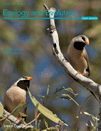
Ecology and Evolution
Bridging knowledge gaps in ecology and evolution.Ecology and Evolution is a leading open-access journal published by WILEY, dedicated to advancing knowledge in the fields of ecology, evolution, and behavior. Since its inception in 2011, the journal has established itself as a critical platform, garnering a significant impact factor and maintaining a prestigious Q1 ranking in multiple categories, including Ecology, Evolution, Behavior and Systematics, and Nature and Landscape Conservation as of 2023. With its continuous commitment to high-quality research, Ecology and Evolution provides a vital conduit for dissemination among researchers, professionals, and students alike. The journal's open-access model ensures that groundbreaking findings are accessible to a global audience, fostering collaboration and innovation across various ecological and evolutionary disciplines. The editorial team invites submissions that explore the intricate relationships between organisms and their environments, aiming to inspire future research that addresses pressing environmental challenges. The journal's rigorous peer-review process guarantees the integrity and quality of published work, reinforcing its position as a frontrunner in its field.
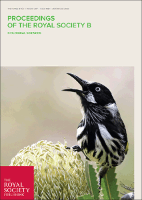
PROCEEDINGS OF THE ROYAL SOCIETY B-BIOLOGICAL SCIENCES
Cultivating Insights in Biological DiversityPROCEEDINGS OF THE ROYAL SOCIETY B-BIOLOGICAL SCIENCES, published by the esteemed Royal Society, stands as a premier platform for disseminating cutting-edge research in the fields of Biological Sciences. With an impressive impact factor reflective of its high citation rates and scholarly contributions, this journal encompasses a wide array of disciplines, including Agricultural and Biological Sciences, Biochemistry, Genetics and Molecular Biology, Environmental Science, and Immunology and Microbiology, consistently ranking in the Q1 category across these fields. Since its inception in 1946, it has been committed to advancing our understanding of biological systems and informing evidence-based practices. Researchers and academics can submit their work without the Open Access barrier, thereby maintaining the integrity of the disciplinary discourse while providing comprehensive insights. The journal's location in the United Kingdom also positions it at the heart of global scientific innovation, making it a vital resource for professionals and students alike who are eager to explore the latest trends and breakthroughs in the biological sciences.

PLoS Genetics
Fostering global collaboration in the realm of genetics and molecular biology.PLoS Genetics, published by the PUBLIC LIBRARY SCIENCE, is a leading open-access journal dedicated to advancing the field of genetics, molecular biology, and related disciplines. With its ISSN of 1553-7404, this esteemed journal has been offering unrestricted access to its content since 2005, fostering a global community of researchers, professionals, and students. Situated in the United States, its contributions can be found at 1160 Battery Street, Ste 100, San Francisco, CA 94111. As of 2023, PLoS Genetics proudly holds a Q1 ranking in multiple categories including Cancer Research, Ecology, Evolution, Behavior and Systematics, Genetics, and Molecular Biology, underscoring its impact in these vital scientific areas. The journal's commitment to disseminating high-quality research is reflected in its impressive Scopus rankings, with notable positions in various fields of study, ensuring that it remains a crucial resource for cutting-edge research and innovation. By providing an open-access platform, PLoS Genetics not only enhances the visibility of genetic research but also encourages collaborations and the sharing of knowledge that can lead to significant breakthroughs in science.

Annual Review of Genetics
Synthesizing Knowledge to Propel Genetic Research Forward.The Annual Review of Genetics is a premier academic journal dedicated to advancing the field of genetics through critical, comprehensive reviews that synthesize current research and highlight future directions. Published by Annual Reviews, this esteemed journal boasts an impressive impact factor, ranking in the Q1 category for Genetics, and holds a distinguished position as 14th out of 347 journals in the Scopus ranking for Genetics, placing it in the 96th percentile among its peers. With its convergence of knowledge from 1970 to 2023, the journal serves as an essential resource for researchers, professionals, and students alike, facilitating a deeper understanding of genetic principles and their applications. Although the journal is not open access, it remains a vital platform for disseminating high-quality, peer-reviewed content that shapes the conversation in genetics, making it a must-read for those seeking to stay at the forefront of this dynamic field.
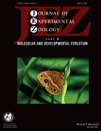
JOURNAL OF EXPERIMENTAL ZOOLOGY PART B-MOLECULAR AND DEVELOPMENTAL EVOLUTION
Pioneering innovative research in the evolution of biological systems.JOURNAL OF EXPERIMENTAL ZOOLOGY PART B-MOLECULAR AND DEVELOPMENTAL EVOLUTION, published by Wiley, is at the forefront of research in the fields of molecular biology, developmental biology, and evolutionary science. With an impressive impact factor reflective of its significance, this journal maintains a prominent position in the academic landscape, evidenced by its Q1 ranking in Animal Science and Zoology, as well as Ecology, Evolution, Behavior and Systematics for 2023. It rigorously publishes innovative research spanning a wide array of topics pertinent to molecular and developmental evolution, making it an invaluable resource for researchers, professionals, and students alike. This journal not only offers Open Access options, enhancing the visibility of groundbreaking findings, but also supports interdisciplinary collaboration by integrating insights from genetics and molecular medicine. With a commitment to advancing knowledge, the journal is poised to contribute significantly to our understanding of biological processes and evolutionary dynamics through its convergence of research from 2003 to 2024.

BMC Ecology and Evolution
Fostering collaboration in the study of life’s processes.BMC Ecology and Evolution is a premier open access journal published by BMC, dedicated to advancing our understanding of ecological and evolutionary processes in a rapidly changing world. With a growing e-ISSN of 2730-7182, this journal serves as a vital platform for researchers and scholars looking to disseminate high-quality research findings that explore the interplay between ecological dynamics and evolutionary developments. Operating from London, England, BMC Ecology and Evolution provides seamless access to valuable research, ensuring that significant studies are available to a global audience without barriers. The journal fosters a collaborative atmosphere, welcoming diverse research methodologies and interdisciplinary approaches, thus making it a crucial resource for professionals, students, and academics alike. Its commitment to open access ensures that pioneering research in ecology and evolution is readily available, encouraging the continuous exchange of ideas and knowledge in the field.